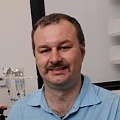As of 30.01.2020
Name of the project: The role of calcium signaling in neurodegenerative diseases
Strategy for Scientific and Technological Development Priority Level: в
Research directions: Molecular and cellular medicine
Project objective: Research of molecular mechanisms of formation and development of neurodegenerative diseases, search for methods of treatment of disruption of work of neurons that lead to neurodegenerative diseases
|
Hosting organization
|
Field of studies
|
City
|
Invited researcher
|
Time span of the project
|
|---|---|---|---|---|
|
Neurodegeneration mechanism: an ancient molecule as an essential element of the physiology and pathology of brain cells
Orel State University named after I.S. Turgenev - (Orel State University) |
Medical biotechnologies |
Orel |
Abramov Andrey Yuriyevich
Russia, United Kingdom |
2024-2028 |
|
Laboratory for Super-elastic Bio-interfaces
Tomsk State University - (TSU) |
Medical biotechnologies |
Tomsk |
Volinsky Alexei Aleksandrovich
USA, Russia |
2021-2023 |
|
Laboratory for Omics Technologies and big data for Personalized Medicine and Health
Skolkovo Institute of Science and Technology - (Skoltech) |
Medical biotechnologies |
Moscow |
Borchers Christoph Hermann |
2019-2023 |




